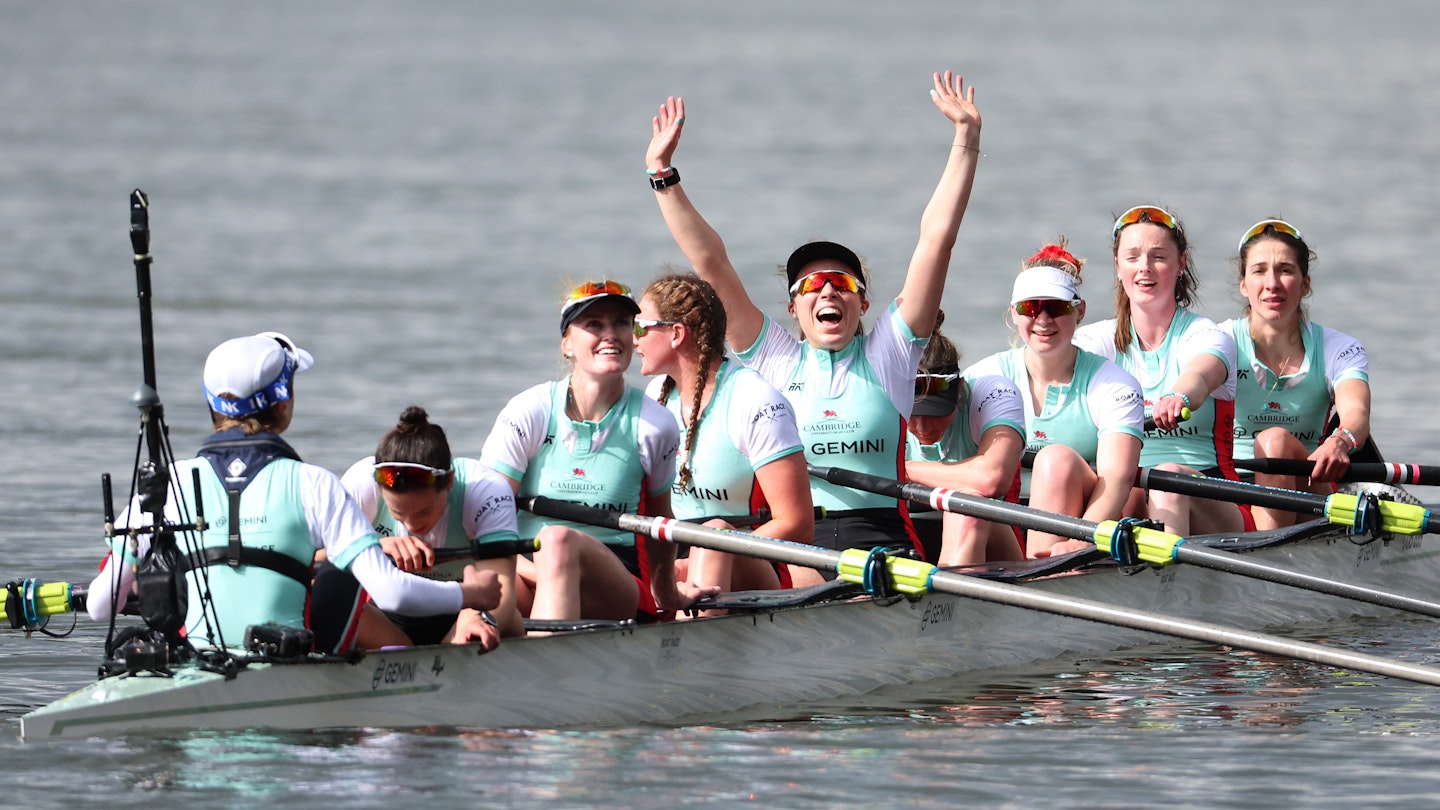‘The stereotype of rowing is posh, public school, white men rowing in boats that cost tens of thousands of pounds who wear blazers that cost hundreds and go to a fancy drinking club,’ Team GB rower Imogen Grant tells Grazia. ‘But my experience hasn’t been like that at all.’
On Sunday, hundreds of people lined the edge of the Thames to watch Grant and her Cambridge teammates race to victory against Oxford in the annual Oxbridge Boat Race in a record time of 18 minutes and 22 seconds. But, despite the growing excitement that now surrounds women’s rowing, their race has only been televised since 2015. Before that, they weren’t even allowed to row on the same day or course as the men.
‘I remember watching the race in 2015 and just thinking wow,’ says Grant who started rowing at Cambridge in 2014 and competed at the Olympics six years later. Tokyo 2020 was the first time rowing had parity between men and women and, as such, Grant’s experience of rowing has felt predominantly more welcoming than many athletes’ before her. However, this is not to say that all inequality problems have been magically resolved.
In 2018, Cambridge University Women’s Boat Club pulled out of an international regatta in Croatia after they were told they would be housed in a hostel, while the men’s team were put up in a five-star resort. ‘Much more interested in non-sexist events,’ the club’s former president Ashton Brown wrote on Instagram at the time as they joined a long line of athletes that demanded fair funding and representation for women’s sport.
Currently, there's a lack of female coaches and Grant tells Grazia she has never been trained by a woman in her seven years of rowing. ‘That really highlights the lag time between the participation and the fact we’re seeing much higher numbers participating,’ she says. ‘It’s going to take much longer for those athletes to come through as coaches.
‘I think it’s really meaningful being coached by a woman if you’re a female athlete. Part of it’s just about challenging what’s assumed to be the norm and also, if you’re the same gender as the people you’re coaching, you understand the space they’re operating within. Whether that’s more easily talking about periods and how that might affect your training or just the collaborative environment you want to create, I think having those role models in coaching is really important.'
According to SportEngland, there are over 300,000 fewer women who are regularly active than men in the UK and men do more sport than women in almost every age group. So, if you were feeling inspired by Sunday’s Boat Race, could now be the time to pick up an oar?
‘A lot of people in the national team learnt later on,’ Grant tells Grazia. ‘If I hadn’t gone to the free drinks and taster session in Cambridge, I don’t think I’d be doing sport right now because my focus was on academics,’ she said. ‘I was the least active I’d been when I arrived at university, but rowing changed my path.’
But rowing is notorious for its gruelling early morning training sessions and, while you just might have been able to drag yourself out of bed for this at university, it’s hard to see how the sport can be an option for working mothers or shift-based staff and, as such, those with more money and time tend to get involved.
‘Rowing is still predominantly white and it’s still predominantly middle class or higher because it can be really expensive to access,’ says Grant who cites programmes like the Gemini Boat Race Bursary Scheme and London Youth Rowing charity as current initiatives to make the sport more accessible. ‘It’s not going to change overnight... Indoor rowing is really becoming a part of [accessibility] too. Just getting people rowing somewhere and maybe onto the water after that.’
"When I’m out on the water, it’s just my moment of calm."
Helen Glover, who captured huge media attention for documenting her journey back to the Olympics after welcoming three children, has been getting her rowing workouts on an at-home rowing machine called Hydrow.
Dubbed by Forbes as the ‘Peloton of rowing’ the machine is actually designed for people who have never done the sport before. ‘We recommend 20 minutes a few days a week,’ Hydrow's CEO Bruce Smith tells Grazia. ‘It’s amazing if you’re balancing your job and your kids and want that efficient workout where you get the benefits to take care of yourself faster.’
One Hydrow session uses 86% of your muscles and, with a 70 per cent aerobic and 30 per cent strength split it’s much harder and more engaging of the whole body than running or cycling. ‘Almost no other activity is as efficient,’ says Smith.
And many Hydrow users find themselves on the river in the end anyway: ‘It’s happening all the time,’ says Smith. ‘We hear of a large percentage of members that seek out their local rowing club because they want to see what it’s like on the water themselves. We don’t want you to stay inside. If you have the time, get down to the river—that’s fantastic.’
While the stereotypical rower’s body is tall with lengthy limbs, Grant (who is 5ft5) is keen to mention that women of any shape or size should try the sport. ‘You can be smaller and still be successful,’ she urges. ‘I just try to find joy in every session and with rowing that’s so easy. When I’m out on the water, it’s just my moment of calm. My moment of pure joy.’
READ MORE: Four Women Talk Style And Sport, All While Taking Nike's Sustainable Trainers For A Spin
The Best Sports Bras For Every Kind Of Exercise, From Low to High Impact
